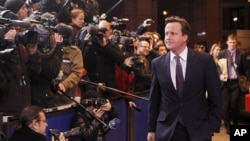European leaders have started a two-day summit in Brussels in the latest effort to resolve the continent's debt crisis and save the euro.
Some officials have described the European summit as a moment of reckoning for the common currency, under siege by Europe's burgeoning debt crisis. But before the meeting opened Thursday night, there remained a divergence of opinion on exactly how to resolve the two-year debt contagion that threatens the stability of the world economy.
U.S. President Barack Obama told reporters in Washington that Europe is prosperous enough to resolve the debt crisis if its leaders have the political will to act.
"Europe is wealthy enough that there is no reason why they can't solve this problem," said President Obama. "It is not as if we are talking about some impoverished country that doesn't have any resources and is being buffeted by the world markets and they need to come hat in hand and get help. This is Europe with some of the wealthiest countries on earth, collectively one of the largest markets on earth, if not the largest."
The economy in the 17-nation bloc that uses the euro has all but stalled, with some analysts saying it has already dipped into a recession. The European Central Bank took a modest step ahead of the summit to boost lending, trimming its prime interest rate a quarter percentage point to one percent, the second cut in two months.
But stocks slid on European and U.S. exchanges after the bank's president, Mario Draghi, dampened speculation that the central bank would increase its purchase of the debt of European governments as one way to cut their borrowing costs. A European regulator said the continent's banks need to raise nearly $154 billion to cover possible losses on government securities they hold.
German Chancellor Angela Merkel and French President Nicolas Sarkozy are calling for the eurozone nations to curb excessive spending and impose strict penalties on violators. Their plan would also create a unified corporate tax rate and a new financial transaction tax.
President Sarkozy said an agreement is essential.
"Everyone can understand that if on Friday we don't find an agreement, there is no second chance," said President Sarkozy. "I call for the spirit of compromise and speedy decision making."
Before heading to Brussels, the German and French leaders tried to rally support for their plan during a meeting of the center-right European People's Party in the French city of Marseilles. Senior officials said late Wednesday that final agreement may not be reached at the summit.
One German official told the Associated Press that it might be Christmas (December 25) before a deal is reached. Another senior official was quoted as saying that some countries "have not understood the seriousness of the situation.
Fears that Europe's debt crisis could spark additional problems have sent jitters through the global financial markets and have prompted warnings from several top credit rating agencies.
Britain, which has its own currency, the pound, has indicated that it may not be willing to sign on to new EU treaty provisions. Prime Minister David Cameron said earlier this week that he will defend Britain's financial interests at the summit.
Some information for this report was provided by AP, AFP and Reuters.









